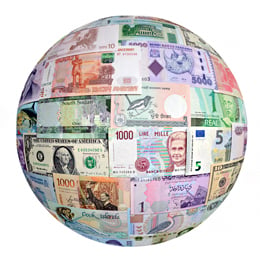 I’m working on two things right now: my economic and market outlook for 2015, and an update on the international economic scene that I’ll present at Commonwealth’s top-producer conferences.
I’m working on two things right now: my economic and market outlook for 2015, and an update on the international economic scene that I’ll present at Commonwealth’s top-producer conferences.
The problem I’m facing with both, I realize, is that the world has really changed in the past couple of years, and the recent past is no longer a good guide to the future. To better understand the new international economy, we need to look back further in history for lessons about how economies and markets will evolve.
Looking to the past for clues about the future
Most market and economic discussion today implicitly revolves around the post-World War II period. During that time, the U.S. was undeniably the predominant economy, and both Europe and Asia were booming as they rebuilt after the war, supported by U.S. aid and a U.S. economy that welcomed their exports.
More recently, the discussion has centered on the post-1989 period. The Cold War was over; once again, the West was triumphant and the dominant, growing economy. The world benefited as Russia and especially China opened their doors to the outside and recovered from the devastation of communism, supported by U.S. and Western openness to their exports.
You may notice two common features here. First, large parts of the world were starting from an incredibly low base, which made growth easy. And second, the U.S. and then the West in general were very open to imports from these growing economies. In this scenario, growth was almost unavoidable.
Today, though, the scenario has changed:
- Instead of starting from a low base, Europe and Japan are now developed economies, and China is well on its way. It’s much harder to grow when you start from a higher level.
- We’re not at the end of a period of conflict; in fact, we’re very possibly at the start of one.
- Globalization is no longer a matter of reaching easy, obvious deals, with substantial benefits for all. Instead, it’s about negotiating hard bargains that require real, specific sacrifices in exchange for real but somewhat diffuse benefits.
From a geopolitical perspective—and, as I’ve written before, politics is economics—the world has also changed. While the U.S. was one of two superpowers after World War II, and the sole hyperpower after 1989, we now live in a much less centralized world. The U.S. could dominate in the past, but now that's increasingly difficult.
Time to focus on another period of history
Clearly, the post-WWII, post-1989 periods no longer offer the best lessons about what the future may hold. To see how things might evolve, we need to look to a different period of history, a time when:
- The world was very globalized
- Power was centralized but emerging powers were rising to challenge their place in the global system
- Trade started to become less intense rather than more so
- All of the world seemed prosperous
We need, then, to go back to the early 1900s. This was a time when war was unimaginable, when global trade networks tied the world together in unprecedented ways, and when the dominant powers found it hard to imagine things changing in any significant way. Of course, the rising powers—Germany and Japan, for example—felt differently.
One hundred years later, we once again have a globalized world, with large interlocked power blocs (the U.S., the EU, Japan, China, Russia). Within those blocs, there is conflict, notably with the rising power of Germany in the EU, and China eclipsing Japan in Asia.
Much has changed since the early 1900s, but learning from history requires looking at the right lessons. I would argue that, as the world changes, the lessons from the past 50 years are becoming less relevant than those from 100 years ago. In future posts, I'll discuss in greater depth how this relates to the global economy.


 Print
Print


